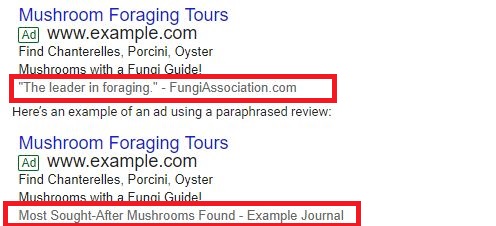Update: Google recently announced that they will be removing review extensions in mid-January 2018, and any existing review extensions will be deleted in early February. To learn about other extension types click here.
Familiar with Google AdWords Review Extension?
If not, you will be.
In this article, I’ll cover all the in’s and out’s of AdWords Review Extension.

Everything You Need to Know About AdWords Review Extension
In theory, review extensions are great.
But in practice, they can be a bit of a pain.
Though it seems straightforward, advertisers have been plagued with issues throughout the approval process.
Which is why I’m breaking down the process for you – requirements, common issues, advantages and all.
What is AdWords Review Extension?
Before we dig into the review extension specifically, let’s talk extensions in general.
AdWords extensions are additional pieces of information you can add to your text ads. Some are manual (you pick ‘em), while others are automatic (Google supplies for you).
These extensions cover everything from additional links to your site, call buttons, product lists, and of course, third-party reviews.
Google reports that adding an extension can improve your click-through-rate (CTR) by 10%-15%, so they’re well worth experimenting with.
Review extensions in particular can be beneficial. They allow you to add reviews from third-party sources, awards or positive press to your ad.
With the added reviews, customers who come across your ad will have the added assurance that your business has received positive reviews, leaving them with a positive first impression and a greater likelihood of click on your ad.
How Does the Adwords Review Extension Work?
The review extension is a manual extension, meaning you get to choose it and set the parameters.
In this case, you decide which review to feature and enter in the quote or paraphrase you would like to show, with a credit and link to the source.
You’re allowed one review extension at a time, which should be about your company in general, not a specific product or service.
As of now, review extensions only appear on search ads (though similar features like seller ratings extensions may be used on display ads, etc.)
The cost? Nothing. As with all extensions, the feature is free and you will be charged the normal CPC for clicks on the ad (and if all goes well, you will be gaining more clicks).

Example of an Adwords Review Extension.
AdWords Review Extension Rules – What to Watch Out For
While the extension is a great addition, it’s not without a few hoops to jump through.
The approval process can get complicated, and many businesses end up with an extension that doesn’t show up on their ads.
To increase the likelihood that your review is approved, there are a few steps to follow.
First up, your source. Google requires your review come from “an accurate, credible, non-duplicative third-party review of the advertiser’s business” and must contain a link to the source site or publication.
Google lists a few things that could end in a disapproval:
- Using individual, personal reviews (not from a publication or organization)
- Using an inaccurate review (inaccurate paraphrase, quotes that don’t appear in original text, etc.)
- Using a review that’s over a year old
- Unacceptable review source (second-hand or republished reviews, paid endorsements, aggregate reviews and rankings, individual customer reviews or testimonials, etc.)
- Unacceptable review format; reviews must come from text on a website, no video reviews, podcasts, PDFs
- Insubstantial reviews (ones that highlight a product or service without highlights, praise or opinions, also cannot focus on a particular location or store)
Familiarize yourself with these rules before deciding which review to use. Because while it may sing your praises, that stellar Yelp review customer testimonial you got won’t cut it on AdWords.
Additional Adwords Review Extension Requirements
There’s one more thing to be aware regarding your sources, and that’s the website it comes from.
Google enforces something called the “Destination Experience,” which basically means that website can’t be difficult to get to or navigate.
For you, that means your review source can’t link to a website that requires a log-in or sign-up to access, and the site can’t be loaded with pop-ups. Even sites with slow load times on popular browsers will be marked for disapproval.
Unfortunately, this does include aspects that are entirely out of your control, such as a link that’s not working or a site that’s not crawlable by AdWords.
You can, however, control how much time you put into researching the domains from which your reviews come from.
I recommend making a checklist with some of the most important features, such as:
- Third-party (not individual)
- Current
- Linkable
- Working domain
- Text format
- Etc.
Check off each item as you review the site to make sure it complies with Google’s requirements.
Common AdWords Review Extension Mistakes
-
The wording of the review
Another major area of confusion is the wording of the review itself.
You must make sure the review accurately represents the text. So even you pull out a quote verbatim, it may still be misleading.
For example, if you pull “the best online experience,” but the rest of the text reads “but I take my shopping needs elsewhere” it could be flagged as misrepresentation.
Something like “the best online experience..for my shopping needs” would also be misleading of the actual text.
-
The age of the review.
Remember, reviews can only be one year old. So if you received an award in 2015, that’s great, but you can’t include it in your extension.
-
Using ratings
Review extensions are text only and from individual sources.
Even if you have a 5 out of 5 star rating you’d love to brag about, save it for your seller ratings. It won’t be welcome in a review extension.
How to Set Up Your AdWords Review Extension
Don’t let the loopholes scare you. Adding a positive review to adds credibility to your ad, and the work will be worth it.
Adding your extension is an easy process.
First, sign in to your AdWords account and click “Campaigns.”
Choose the campaign you would like to add the extension to, and click “Ad Extensions.”
Then, Scroll to the “View” menu and choose “Review Extensions.”
Select “Account Extension” and the “+extension” button.
Here, you’ll select +New Review at the bottom. Once you’re taken to the review screen, select either “Paraphrased” or “Exact Quote” for the format option.
Then you will enter the review in the text box, the name of the review source is the source box, and the source’s URL in the URL box.
Hit save, and you’re done.
Remember, you are limited to 67 characters (review and source combined). You may enter multiple reviews at one time, but the first one approved by Google will be the one that shows up on your ad.
Monitor Your Review Extension Performance
Once you’ve added your extension (and passed the approval process), measure its performance through your AdWords account.
Select the “ad extensions” tab and then the “view: review extensions” to access.
There you’ll find a table with various performance metrics, including:
- Your extension’s status – this will tell you whether or not your extension has been approved; if it shows as disapproved, revisit the guidelines above
- How many clicks your ad received while using the extension
- Impressions: how many times your ad was viewed with the extension
- CTR – how many clicks your ad had received divided by the number of times it was seen
- The total cost of your clicks using the extensions
- Your ad’s average position on search engine result pages (SERPs) using the extension
- The average amount you pay per click using the extension
As always, if the numbers aren’t adding up or reaching your intended goal, tweak the extension. Try using a different review, or different quote. If you were initially paraphrasing, try pulling an exact quote instead to test which is more effective.
Start Using AdWords Review Extension
Getting the review extension right isn’t exactly an easy process.
But that’s okay. Ultimately, you’ll have selected an accurate, trustworthy review to represent your company to searchers all over the world.
And if all goes well, that review will increase your ad’s relevance, your brand’s reputation, and your potential customer’s overall engagement.